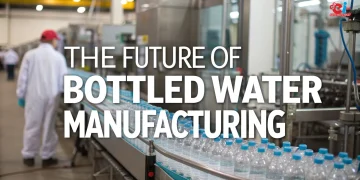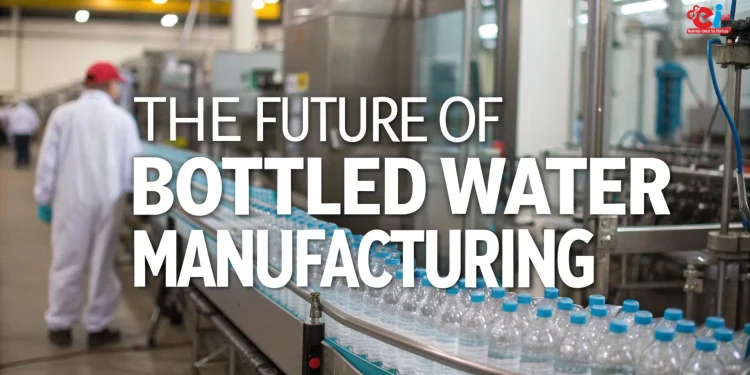As hygiene and health become a growing concern for people, bottled water manufacturing has transformed from just a product to a necessity. For micro, small, and medium enterprises (MSMEs) and other entrepreneurs looking forward to high demand, health-centric manufacturing ventures, bottled water manufacturing is one of the easiest and most scalable businesses to set up.
The need for packaged drinking water is surging in Rural India and even Tier 1 cities due to increased health awareness, urbanization, travel, poor quality of tap water and growing disposable incomes. For new industrialists, or any trader looking to move into faster-moving consumer goods (FMCG) manufacturing, the opportunity is high, provided you enter with proper planning, processes as well as strategic foresight.
This guide will discuss in detail the growth potential and forecasts of the market and provide a step-by-step blueprint of starting a bottled water manufacturing business, from sourcing and treating water to packaging and ensuring all regulatory compliance.
Why Bottled Water Manufacturing Business is the Effective Strategy
An Investment with Sizable Market Demand and an Evolving Use
The consumption of packaged drinking water has tremendously evolved in the past few years and has turned into an indispensable asset for eateries, schools, offices, hospitals, or even for families. Everyone uses bottled water for its convenience and cleanliness. After COVID-19, consumer preference has heavily shifted towards trusted brands that are perceived to be sanitized and safe, further spiking demand.
Low Consumption Rates per Capita = A Great Opportunity
India’s consumption per capita is still much lower compared to the global waters market in relation to industry’s growth potential. Demand in the country is currently outpacing available supply, indicating a need for massive investment. In fact, within India’s non-alcoholic beverage industry, bottled water is one of the fastest growing segments.
Projected Growth of India’s Bottled Water Market (2025 to 2030)
Let’s look at an analysis-based forecast for the growth potential of this sector:
| Year | Market Size (INR Billion) | Annual Growth Rate (%) | Increased Demand |
| 2025 | ₹315 | 12.8% | Urbanization, infrastructure lag, extreme heat, and public works |
| 2026 | ₹356 | 13.0% | FMCG growth and hospitality demand as well as rural consumption |
| 2027 | ₹404 | 13.5% | Franchise models, new entrants, and stronger brand advertising |
| 2028 | ₹460 | 13.8% | Expanded sustainable packaging initiatives and premium water brands |
| 2029 | ₹523 | 14.0% | Institutional sales with health-conscious clientele and consumers |
| 2030 | ₹595 | 13.7% | D2C bottled brands and tech supply chains |
Related: How to Start a Manufacturing Business of Flavored Drinking Water
The Categories of Bottled Water Products You Can Manufacture
It’s critical to identify the segment of bottled water you wish to manufacture and sell:
- Packaged Drinking Water – most common and scalable, this is treated and purified water from the source.
- Natural Spring Water – directly sourced from springs or other natural bodies.
- Flavored – Water enriched with minerals, vitamins, or other flavoring herbs/compounds.
- Alkaline – premium fitness and wellness sectors are trending with pH balanced water.
- Bulk Bottled Water (20L jars) – B2B sales to offices and events in bulk.
4. Detailed Instructions: The Complete Process of Bottled Water Manufacturing
We will outline the steps taken from raw water acquisition to your finished bottled product.
Step 1: Water Sourcing
Water can be procured from borewell, municipal supplies, or natural sources (in the case of mineral water).
Water needs to go through pre-filtration to remove physical impurities such as sand or other suspended particles.
Step 2: Water Purification & Treatment
- Multistage Filtration (sand + carbon filter)
- Reverse Osmosis (RO) System
- UV Sterilization to kill microorganisms
- Ozonation for extended shelf life
Step 3: Quality Testing & pH Balancing
- Monitoring TDS (Total Dissolved Solids)
- Microbiological & chemical analysis of water
- Adjusting pH levels between 6.5 to 8.5 as per BIS guidelines
Step 4: Optional Water Bottle Manufacturing
- NPET preform blowing into bottles (can also be outsourced initially)
- Caps and labels prepared for branding
Step 5: Bottling and Packaging
- Automatic bottling line: rinsing → filling → capping → labeling → shrink wrapping
- Available in 200ml, 500ml, 1L, 2L, and 20L containers
Step 6: Storage and Distribution
- Pre-cooled stored water before distribution
- Contracted logistics with retailers, wholesalers, and institutional buyers
Related: Crafting a Business Plan for a Distilled Water Production Company
BIS Standards and Licensing
Legal requirements in India for selling packaged drinking water include:
- BIS Certification – IS 14543 for packaged drinking water
- FSSAI License – Food Safety and Standards Authority of India
- Pollution Control Clearance – for groundwater extraction and effluent discharge
- Factory License + local municipal approvals
Meeting these legal requirements, while not mandatory, provides regulatory compliance no brand exposure issues and prevents legal complications.
Raw Materials and Utilities Required
Even though water stands as the core input, there are supporting peripheral materials, water, and utilities that are of critical importance.
Raw Materials
- Raw water
- Bottles and PET preforms
- Bottle caps
- Labels and shrink films
- Disinfection Chemicals such as Chlorine and Ozone gas
Utilities
- Electricity for filtration and packaging (needed 24/7)
- Legally cleared water source
- Compressed air for bottle blowing machines
- Generators (especially in semi-urban/rural areas)
Important Factors for New Entrepreneurs to Surpass Competitors
A. Brand Trust and Hygiene Perception
Design, branding and communication revolving purity, the trusted process, and hygienic bottling serve as brand conversion factors.
B. Network Expansion
Market and sell via B2B and retail targeting schools, offices, restaurants, event venues, kirana stores and e-commerce.
C. Advanced Automation
Smart Hygiene Automation technology in bottling, capping, and labeling saves on manpower while maintaining hygiene standards critical for profitable scaling.
D. Franchising or Third-Party Bottling
Locally established businesses can then change to franchise systems or contract regional bottling for more affordable growth expenses.
What Trends of the Market Entrepreneurs Should Follow
- Eco-friendly packaging: Biodegradable plastic and paper bottles alongside reusable packaging attract eco-friendly urban customers.
- IoT enabled quality monitoring – Smart sensors for automatic real time tracking with alerts for maintenance guarantees flawless monitoring.
- Rural bottling plants: Mini plants in rural areas provide affordable distribution while unlocking high volume prospects.
- Brand Personalization: Niche segments are attracted to localized branding like ‘Himalayan purity’ and ‘Ayurvedic infused water’.
Bottled Water Compared to Other FMCG Sectors
| Parameter | Bottled Water | Soft Drinks | Snacks |
| Health Perception | Very High | Low | Medium |
| Entry Barrier | Moderate | High | Medium |
| Shelf Life | 6–12 months | 4–6 months | 3–9 months |
| Seasonality Impact | High (Summer) | Medium | Low |
| Daily Repeatability | High | Moderate | Low |
| B2B Demand | Very High | Medium | Low |
Your Success with NIIR Project Consultancy Services/NPCS
For new entrepreneurs, conducting market analysis, licensing, plant setup, and evaluation can create a lot of confusion. That’s where NPCS steps in.
For NPCS, a packaged drinking water market survey was carried out along with detailed techno-economic feasibility reports.
The reports detail the manufacturing process, raw materials, machinery and equipment, plant layout, compliance requirements, and financial projections.
With expert consulting on site selection, technical expertise, and market strategy, NIIR aids in assessing new industry setups.
Conclusion: A Clear Path to a Clean Business
The bottled water manufacturing business, when built on compliance, quality, and branding, offers a profitable and evergreen venture for India’s next wave of industrial entrepreneurs. Whether you aim to serve a local town or build a national hydration brand, the opportunity is wide open, supported by rising demand, scalable technology, and consumer trust in safe water sources.
By focusing on the right processes, adopting automation, and working with expert partners like NPCS, you can build a successful bottled water manufacturing brand that quenches more than just thirst it builds a long-lasting industrial legacy.


















